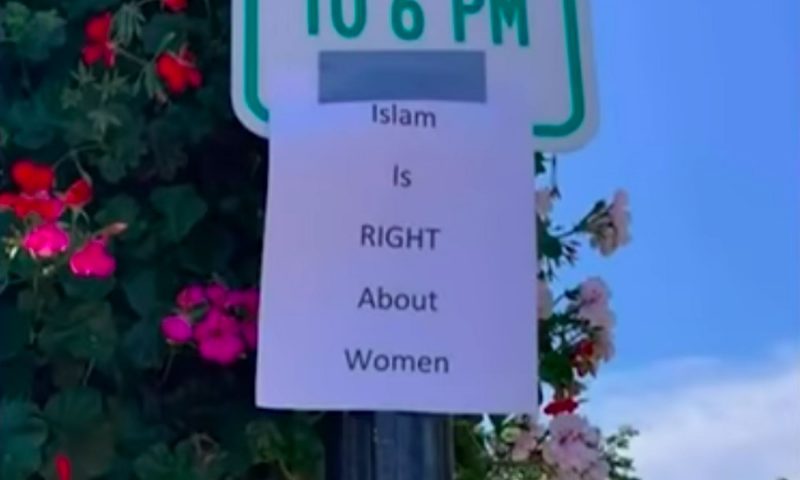For all that Donald Trump is known for trolling his opponents on Twitter, he’s certainly not the only one, as these makeshift posters in Massachusetts illustrate:
The locals are outraged, but as Alaa Al-Ameri describes, they’re not quite sure how to safely express their fury:
Think of Posie Parker’s billboards quoting the dictionary definition of the word “woman”. The power of such acts comes from two things. First, they acknowledge – usually with irreducible simplicity – that something that went without saying a moment ago has suddenly become unsayable. Secondly, the outrage they provoke does not come from any epithet, caricature or insult, but rather from having the nerve to draw the viewer’s attention to an act of cognitive dissonance that we are all engaging in, but would rather not acknowledge.
The result is that those who attempt to explain why the act is offensive end up simply tying themselves in knots, while revealing that they have never given a moment’s thought to the position they find themselves defending. This seems to generate even more anger, with the inevitable online mob quickly joined by politicians, journalists and other public figures, eager to see that the heretic is made an example of.
At their best, these acts of public disobedience are examples of real-life Winston Smiths pointing out to the rest of us that “Freedom is the freedom to say that two plus two make four”. Their persecutors, like his, are those who know and fear the truth of Smith’s next sentence: “If that is granted, all else follows.”
The example of perfectly crafted dissent that I’d like to submit here appears in this video from Massachusetts local TV news, showing some reactions to the fly-posting of white sheets of paper bearing the statement “Islam is right about women”. The reactions are deeply revealing. Nobody can clearly point out why they object to the statement – indeed, nobody seems to object to the statement at all on its face. Yet most seem to express offence at it – if a little unconvincingly.
The reason for their dilemma is obvious enough to anyone who has been paying attention. Western society has managed to convince itself (at least in public) that any statement criticising any aspect of Islam is, by definition, bigotry. As a result, Western societies have effectively decided to enforce Islamic restrictions on blasphemy, and called it “tolerance”.
The strain of conforming to this lie is evident in the fumbling attempts by the interviewees to explain their objections. Do they believe that Islam is right about women? If so, why the objection? Do they believe that Islam is wrong about women? If so, in what sense is the statement an attack on Islam or Muslims? Do they believe that the author of the poster is saying that “Islam is right about women”, but doing so ironically? In which case, the objection can only be that the author is guilty of a thoughtcrime by stating that “two and two make five” with insufficient sincerity. Or do they worry that they are guilty of thoughtcrime for noticing the irony?




